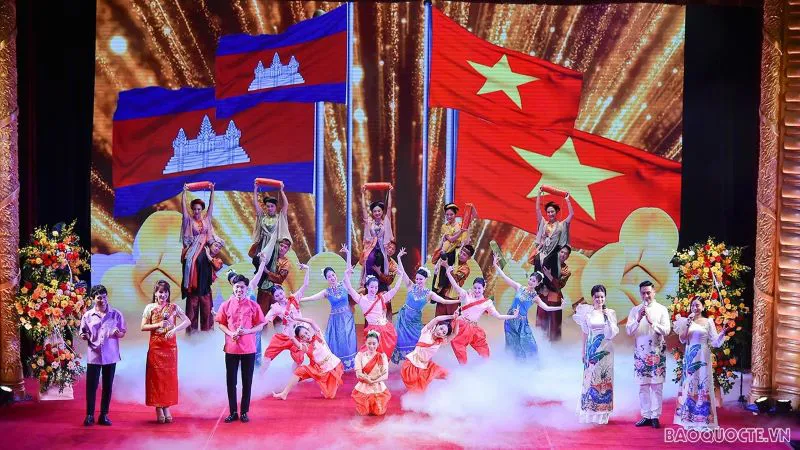Vietnam entirely justified in exercising self-defense against Khmer Rouge: Carl Thayer
Famous specialist on Southeast Asia Carl Thayer said Vietnam was entirely justified under international law in exercising self-defense against the Khmer Rouge who first attacked Vietnamese island territories in 1975.
Vietnam and Cambodia celebrated the 55th anniversary of diplomatic relations on June 24, 2022. On this occasion, Emeritus Professor at the University of New South Wales (UNSW), Canberra Carl Thayer wrote to The Hanoi Times his insights into the relations between the two neighboring countries.
| The 55th anniversary of diplomatic ties between Vietnam and Cambodia celebrated in Hanoi on June 24. Photo: Baoquocte |
1/ How important do you think it was to Vietnam and Cambodia when the two countries established diplomatic relations on June 24, 1967?
In 1967 the war in Vietnam was escalating as the United States poured more ground troops into South Vietnam and sought to interdict the Ho Chi Minh Trail. At the same time, the U.S. continued its air war over North Vietnam.
Prince Norodom Sihanouk consistently followed the path of neutrality and non-alignment since independence from France in 1953. However, neutrality was difficult to maintain as the war in South Vietnam spilled over into Cambodia.
Prince Sihanouk made the correct assessment that in the long-term the Democratic Republic of Vietnam would prevail and reunify the country. This led to the establishment of diplomatic relations on 24 June 1967.
2/ What is your assessment regarding Vietnam’s role in liberating Cambodia from the Khmer Rouge in 1979?
Vietnam was entirely justified under international law in exercising self-defense against the Khmer Rouge who first attacked Vietnamese island territory in 1975. There was a brief hiatus in 1976 when both sides negotiated on border issues.
But in the final quarter of 1976 and continuing into 1977-78, the Khmer Rouge stepped up their aggression with cross-border attacks on Vietnamese villages. Vietnam responded by counter-attacking but this did not deter the Khmer Rouge who continued to massacre Vietnamese living in the border area.
Vietnamese forces joined with Cambodians who fled the Khmer Rouge regime and together liberated the country from the Khmer Rouge’s genocidal rule in late 1978-early 1979.
3/ Cambodian leaders have repeatedly affirmed that without Vietnam’s help, they would not have survived. What is your assessment of this?
I first visited Cambodia in August 1981 and returned regularly in the 1980s. I met many Cambodian officials who had lived under the Khmer Rouge. I also visited the mass graves of victims of the Khmer Rouge. If Vietnam had not supported the Cambodian forces opposing the Khmer Rouge the genocide would have continued and hundreds of thousands of Cambodians would have perished. Cambodian leaders are correct, they would not be alive today if Vietnam had not intervened.
4/ What is your view on the trend and prospects of Vietnam-Cambodia relations in the years to come?
This year is the Vietnam-Cambodia, Cambodia-Vietnam Friendship Year. The general trend in the future will be carried out under the expression “good neighborliness, traditional friendship, comprehensive cooperation, and long-term stability” adopted by both parties. For example, the demarcation of the land border is eighty-four percent complete and both sides are striving to complete this process in the coming years now that both are recovering from the COVID-19 pandemic.
Special Economic Zones have sprung up along the border to facilitate mutually beneficial trade to exceed $5 billion. Both sides will implement the Master Plan on Vietnam-Cambodia Economic Connectivity to 2030 and the Memorandum of Understanding on Cooperation Strategy in the Transport Sector for the 2018-2025 period with a Vision to 2030.
Cambodian and Vietnamese military forces cooperate to repatriate the remains of Vietnamese soldiers who were killed in the fighting against the Khmer Rouge.
Cambodian military officers continue to attend Vietnamese military training courses. And Vietnam, Cambodia, and Laos will continue to work together to develop the Mekong sub-region.
Thank you for your time!












